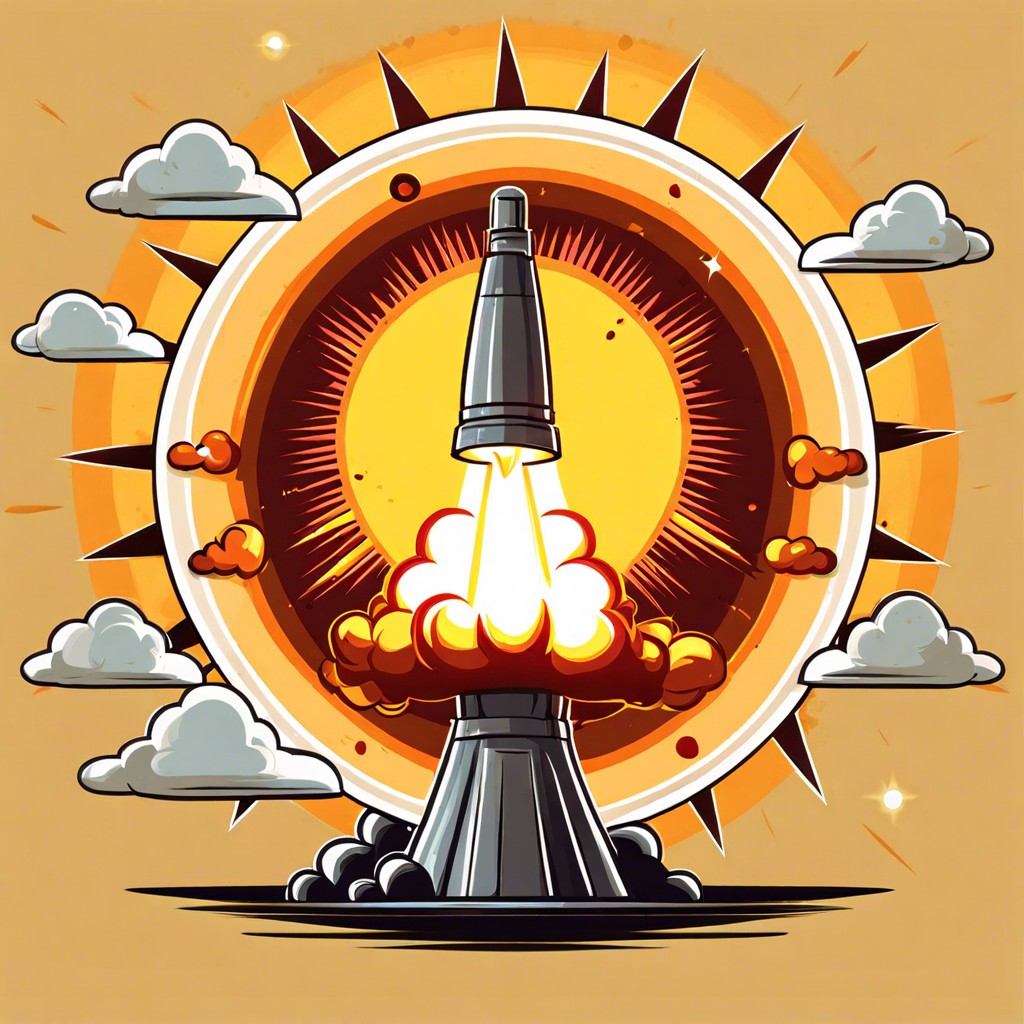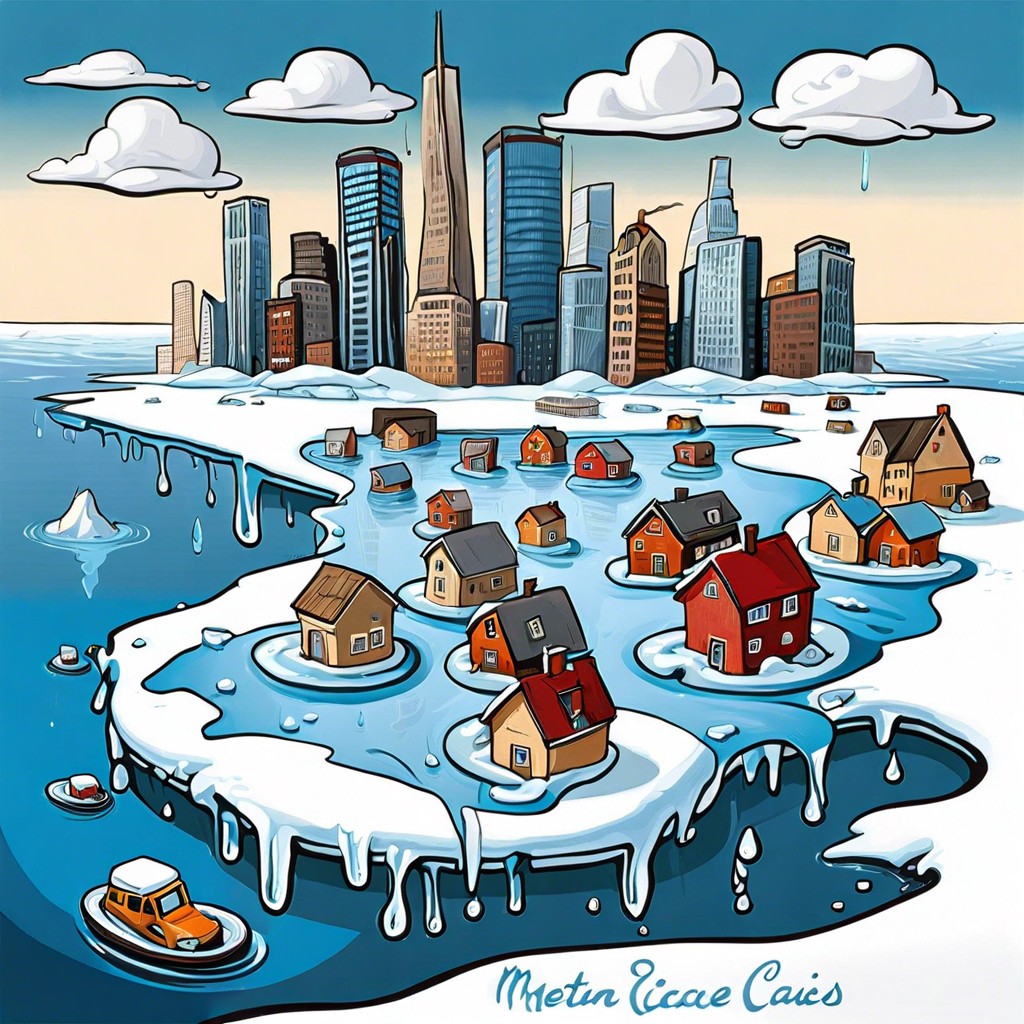Discover the cosmic consequences of what would happen if we nuked the Sun.
Ever had one of those wild, science-fiction-fueled daydreams and thought, “What if we dropped a nuke on the Sun?” Crazy idea? Certainly. Nevertheless, let’s dive headfirst into the heart of this colossal fireball and see what happens when human curiosity meets unrestrained power. We’ll explore the physics behind such an act, the potential twists in the Sun’s personality, and the domino effect it could cast across the cosmos, right down to Earth. Buckle up for a rollercoaster ride mixing science, speculation, and a sprinkle of moral quandaries.
Key takeaways:
- Nuking the Sun wouldn’t make a dent in its power.
- The sun’s core temperature dwarfs any nuclear bomb’s heat.
- Impact on the solar system would be negligible.
- Earth wouldn’t feel a thing from a nuke on the sun.
- Nuking the sun raises scientific and ethical red flags.
The Physics of Detonating a Nuke in (or Near) the Sun

Imagine launching a nuclear bomb straight into the sun. Sounds wild, right? Well, here’s a fun fact: the sun is already a massive nuclear reactor! It fuses about 600 million tons of hydrogen every second.
Our puny nuke, powerful as it may seem on Earth, is like throwing a snowball into a volcano. The energy from a nuclear bomb is minuscule compared to the sun’s gigantic power. We’re talking about comparing a matchstick to a bonfire.
A nuke’s explosion primarily involves fission or fusion. The sun relies on fusion but at a scale we can’t even fathom. When we measure a bomb’s explosion in megatons, the sun’s nuclear dance is in the billion, or even trillion, megaton range. Humbled yet?
Moreover, space isn’t the best place to ignite a nuke. Bombs require an atmosphere to create a shockwave. In space, there’s none—just empty, cold nothingness. If a nuke did explode nearby, the radiation and charged particles would simply get swallowed by the sun’s magnetic field without much drama.
The bottom line is straightforward: our attempt to outdo the sun’s might with a nuclear bomb would be about as effective as trying to light up a stadium with a matchstick.
Potential Changes to the Sun’s Behavior or Structure
The sun is one giant nuclear fusion reactor, so dropping a tiny nuke in or near it is less than impressive. Here are some points to consider:
First, the nuke’s explosion itself would be a speck compared to the sun’s colossal power output. We’re talking a grain of sand in the Sahara Desert level of insignificant.
Second, the sun’s core, where fusion actually happens, operates at temperatures around 15 million degrees Celsius. Our finest nukes max out at a measly few million degrees. It’s like trying to light a bonfire with a matchstick. The sun wouldn’t even notice.
Third, the sun’s structure is a complex layer cake of gases, plasma, and extreme forces. A nuke wouldn’t penetrate deeply enough to mix things up. It would be more like a firework in a windstorm: pretty but pointless.
Remember, the sun’s behavior is dictated by unfathomable gravitational and nuclear forces. Our largest nuclear bomb would be swatted away by these forces like a fly.
To sum up: a nuke vs. the sun is like a sneeze versus a hurricane.
Possible Effects On the Solar System
First off, let’s address the big question: no, we wouldn’t go all “Death Star” on the whole solar system. Nuking the sun would be like trying to set fire to a swimming pool. The nuclear explosion would be a gnat’s sneeze compared to the sun’s own energy output.
Next up, changes in the sun’s core? Unlikely. Even if we somehow managed to deliver our nuke to the sun’s surface, it wouldn’t penetrate deeply enough to mess with the core, thanks to the sun’s thick layers.
Now, radiation. A nuke might add a tad of radiation to the already energetic solar mix, but the sun’s radiation is already off the charts. It’s like adding a drop of vinegar to an ocean of lemonade—a whole lot of nothing.
Lastly, affecting celestial bodies. Planets and moons are governed by the sun’s gravity, not its fiery temperament. The nuke wouldn’t put a wobble in Mercury’s orbit or cause Saturn’s rings to unspin.
In summary, while it sounds dramatic, detonating a nuke on the sun wouldn’t leave much of an impact on our solar neighborhood. We’re ants throwing a firecracker at the sun god—impressive in a tiny-ant sort of way, but otherwise trivial.
Impact On Earth and Human Life
Firstly, a nuke in the sun is more like an ant bite for a T-Rex. The sun is a gigantic nuclear reactor already, and adding our puny firecrackers won’t redefine its day.
The immediate effect on Earth would be, well, nil. The sun’s massive energy completely overshadows any man-made detonation. So, no instant doomsday scenario—phew!
However, let’s talk about potential indirect effects. Imagine the thrill of scientists detecting a minute gamma-ray uptick or a slight solar flare hiccup. This might affect our satellites or mess with your GPS, but nothing civilization-ending.
Here’s the funny part: humans just spent trillions on a sun-nuking adventure with zero return—except maybe the world’s biggest “what were they thinking?” meme.
Lastly, solar observers would have a field day writing papers about a nuke going pop in the sun. Future generations might laugh at our cosmic fireworks attempt, much like how we chuckle at alchemy today.
Scientific and Ethical Considerations
When pondering this wild hypothetical, it’s vital to grasp both scientific boundaries and ethical mores.
First, science isn’t just about asking “Can we?” but “Should we?” Nuking the sun would provide an excellent lesson in hubris—it’s like poking a sleeping dragon with a toothpick. Spoiler: it won’t end well.
Then there’s the ethical dilemma. Disrupting a colossal natural body isn’t just irresponsible—it’s galactically audacious. We barely manage our own planet’s climate; the sun is out of our league.
On another note, the sun’s stability governs life on Earth. Messing with it isn’t a Saturday experiment. Think about the moral implications of putting all life at risk, including Grandma’s garden, pets, and pizza parties.
Simply put, we shouldn’t be treating celestial bodies like oversized stress balls for science experiments.




